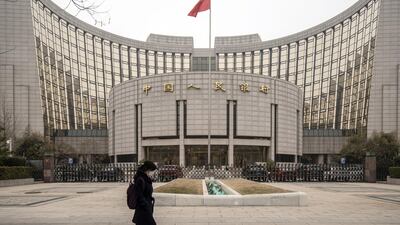The rapid development of central bank digital currencies could help to boost financial inclusion and stability, but they pose a threat to banks and could weaken their ability to lend, according to a report by Fitch Ratings.
CBDCs would help to speed up cashless payments and could "bring underbanked communities into the financial system" in many emerging markets.
In the Bahamas, for instance, where the "Sand Dollar" CBDC was introduced in October, low-value CBDC transactions can be carried out using just a phone number or an email address for identification.
“The deployment of CBDCs will create opportunities to strengthen financial system inclusion, innovation, resilience and efficiency, but may also give rise to new risks,” said Monsur Hussain, an analyst at Fitch Ratings and co-author of the report.
For instance, CBDCs "will inevitably involve households and businesses converting some of their commercial bank deposits into CBDCs", the report said.
"All other things being equal, this would require banks to shrink their balance sheets", affecting their capacity to lend, it said.
China was one of the first major economies to develop plans for a CBDC back in 2014 and has already begun limited trials via mobile apps. Other major economies are quickly following suit.
Last month, the Bank of Japan began a year-long series of experiments for a digital yen and the UK Treasury and Bank of England set up a joint task force to develop a CBDC, nicknamed the "Britcoin".
And on Thursday, Federal Reserve chairman Jerome Powell announced that the US central bank will publish a discussion paper over the summer "outlining our current thinking on digital payments, with a particular focus on the benefits and risks associated with CBDC in the US context".
The Fed will listen to a range of voices before deciding "whether and how to move forward with a US CBDC, taking account of the broader risks and opportunities it could offer", said Mr Powell.
Whether or not the Fed proceeds with a CBDC, "we expect to play a leading role in developing international standards for CBDCs, engaging actively with central banks in other jurisdictions as well as regulators and supervisors here in the US", he said.
Governance and oversight of CBDCs is an issue that many of the pilot projects are wrestling with – particularly how to make digital payments easier while replicating the "anonymity of cash", Fitch Ratings said.
Complete anonymity for transactions is probably unlikely, given that this is one of the challenges central banks face with the growth of cryptocurrencies as an asset class and their widespread use in illicit activity.
Cryptocurrencies "have not served as a convenient way to make payments, given, among other factors, their swings in value", said Mr Powell.
He also indicated that as "stablecoins" – digital assets that are linked to the US dollar or other currencies – grow in use, so will the Fed's oversight of them.
Although users "may be reluctant to accept a digital cash substitute if it does not grant a sufficient degree of privacy", trade-offs already exist between anonymity and regulators' ability to track illegal activity, even through the use of cash, the Fitch report said.
"There may be variations in anonymity between markets, depending on local attitudes among the public and regulators. Party identification data may, for example, be limited between transaction participants. However, we believe in general that central banks and regulators are likely to have access to such information with CBDC transactions," said Fitch Ratings.
CBDCs could also give governments and central banks much greater control over how money is used, with programmable smart contracts allowing them to embed restrictions in how a currency is spent, for example.
A digital currency distributed as part of stimulus packages could also have expiry dates to encourage it to be spent within a specific period of time, the credit rating agency said.
Another potential benefit is the use of CBDCs in cross-border payments. The central banks of the UAE and Saudi Arabia concluded a year-long study known as Project Aber last year, which "confirmed that Distributed Ledger [blockchain] Technology can provide central banks with the ability to reimagine both domestic and cross-border payment systems in new ways".
In February, the UAE Central Bank said it was participating in a central bank digital currency project with the Hong Kong Monetary Authority, the Bank of Thailand and the People's Bank of China to investigate the use of CBDCs in cross-border payments.
"With issuance of CBDCs, money transfers [within and between countries] could be improved in terms of efficacy and cost," Deutsche Bank's chief investment officer Christian Nolting said in a note to clients last month.
However, any cross-border payment system that reduces the dominance of the US dollar in the global financial system could face challenges, Fitch Ratings said.
"Previous efforts to develop payment systems to bypass those controlled by the US have struggled, such as one launched by the EU to allow trade with Iran after the US tightened sanctions in 2018. This partly reflects the strong network effects enjoyed by incumbent systems, as well as the complexity of negotiating interoperability between jurisdictions."


